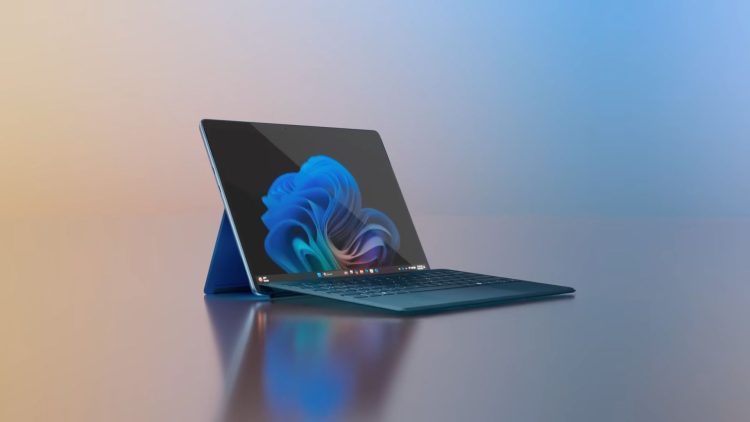All of Microsoft’s MacBook Air-beating benchmarks have recently emerged, setting the stage for a potential shakeup in the laptop market.
With the release of its new Surface Laptop powered by Qualcomm’s Snapdragon X Elite processor, Microsoft is making a bold claim: It can outperform Apple’s MacBook Air M3 in key areas like performance, price, and battery life.
This unexpected development has captured the attention of tech enthusiasts and casual users.
The new Surface series beats M3 Macbooks
For years, Apple’s MacBook Air has been the gold standard for lightweight, ultra-portable laptops. Its combination of sleek design, powerful performance, and long battery life has made it a favorite among students, professionals, and creatives. However, Microsoft’s latest offering suggests that the landscape may be shifting. Early benchmarks indicate that the Surface Laptop, with its Snapdragon X Elite chip, could surpass the MacBook Air M3 in several critical areas.
The implications of these benchmarks are significant. If Microsoft can deliver on its promises, it could attract a new audience of users who prioritize performance and value. Moreover, it could force Apple to reassess its strategy and push for even greater innovation in its future MacBook Air models. In the following sections, we will delve deeper into the specific benchmarks that have sparked this conversation, exploring the potential impact on the laptop market and what it means for consumers.
Here is the full benchmark according to The Verge‘s report:
| Benchmark | Surface Laptop (Snapdragon X Elite) | MacBook Air M3 | Surface Laptop 5 | Surface Laptop 4 |
| Cinebench 2024 MT | 980 | 650 | 480 | 300 |
| Geekbench 6 MT | 14,000 | 12,000 | 9,200 | 6,300 |
| HandBrake ToS 4K | 5:08 | 6:26 | 10:30 | 13:32 |
| Battery life (web hours) | 16:56 | 15:25 | 8:38 | 8:25 |
| Battery life (video hours) | 20:00 | 17:45 | 12:30 | 12:30 |
| Procyon AI score | 1,745 | 889 | N/A | N/A |
Snapdragon X Elite is an “elite” chip indeed
Qualcomm’s Snapdragon X Elite chip is the driving force behind Microsoft’s ambitious claims. This new processor is designed to deliver exceptional performance while maintaining impressive energy efficiency. Early benchmarks suggest that it could outperform the Apple M3 chip in several key areas, including raw processing power, graphics capabilities, and AI acceleration. This performance boost could translate to faster application loading times, smoother multitasking, and enhanced capabilities for AI-powered features like voice recognition and image processing.
One of the most notable advantages of the Snapdragon X Elite is its integrated AI accelerator. This dedicated hardware is designed to handle AI workloads more efficiently than traditional CPUs, potentially leading to significant performance gains in AI-powered applications. Microsoft is particularly excited about the potential of this chip to power its new Copilot Plus service, which leverages AI to enhance productivity and creativity. The Surface Laptop, with its Snapdragon X Elite chip, could be the perfect platform for showcasing the capabilities of Copilot Plus, offering users a seamless and intuitive experience.

Beyond benchmarks
While benchmarks provide valuable insights into the raw capabilities of a device, they don’t always reflect the real-world experience of using it. Factors like software optimization, thermal management, and overall system design can all impact how a laptop performs in everyday use. Microsoft claims that the Surface Laptop, with its Snapdragon X Elite chip, has been carefully engineered to deliver a smooth and responsive user experience. The company has worked closely with Qualcomm to optimize the software for the new chip, ensuring that applications run smoothly and efficiently.
Moreover, Microsoft has implemented advanced thermal management techniques to prevent the laptop from overheating, even under heavy workloads. This is particularly important for users who rely on their laptops for demanding tasks like video editing or gaming. By maintaining optimal temperatures, the Surface Laptop can sustain high performance levels without sacrificing user comfort or battery life. Ultimately, the success of the Surface Laptop will depend on how well it translates benchmark performance into real-world usability. If Microsoft can deliver on its promises, it could challenge the MacBook Air’s dominance and offer users a compelling alternative.
As we move forward, it will be interesting to see how Apple responds to this new competition. Will it double down on its M-series chips and continue to push the boundaries of performance and efficiency? Or will it explore new technologies and partnerships to maintain its edge?
Whatever the future holds, one thing is clear: The laptop market is becoming more exciting and dynamic than ever before.
Featured image credit: Microsoft Surface/YouTube





